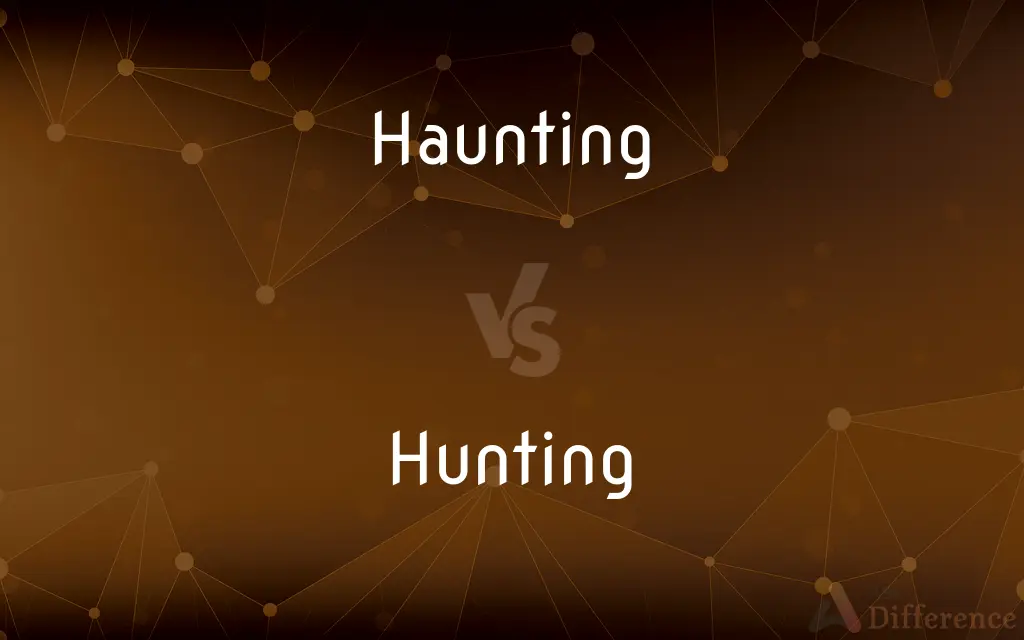Haunting vs. Hunting — What's the Difference?
By Tayyaba Rehman & Urooj Arif — Updated on April 8, 2024
Haunting involves the presence or recurring appearance of ghosts, often linked to specific locations, while hunting refers to the pursuit and killing or capture of animals for food, sport, or control.

Difference Between Haunting and Hunting
Table of Contents
ADVERTISEMENT
Key Differences
Haunting typically implies a supernatural or eerie experience associated with ghosts or spirits revisiting the living world, often tied to particular places believed to have unresolved or tragic histories. This can involve sightings, sounds, or feelings of a ghostly presence. On the other hand, hunting is a deliberate activity where humans pursue animals in the wild, either as a means of subsistence, for sport, or for wildlife management. It involves skills such as tracking, camouflage, and the use of weapons.
While haunting is centered around the paranormal and often involves stories, myths, or personal experiences related to spirits or ghosts, hunting is grounded in the physical world and has practical, cultural, or recreational purposes. Hunting has been a part of human history for centuries, serving as a means of survival and playing a role in wildlife conservation and management, whereas haunting deals more with the metaphysical and is a common theme in folklore and horror genres.
The impact of haunting on individuals can range from fear and fascination to skepticism, depending largely on personal beliefs and experiences with the supernatural. Conversely, hunting impacts both the ecosystem and society; it can contribute to the conservation of habitats and species through regulated practices, but it also raises ethical debates regarding animal rights and the environment.
The appeal of haunting stories and locations is often rooted in the mystery and thrill of the unknown, offering a sense of adventure to those intrigued by the paranormal. In contrast, hunting is appreciated by enthusiasts for the connection it offers with nature, the challenge it presents, and its role in tradition and conservation.
Comparison Chart
Definition
Presence of ghosts or spirits
Pursuit and capture or killing of animals
ADVERTISEMENT
Purpose
To manifest unresolved past or scare
For food, sport, or wildlife management
Basis
Supernatural, paranormal
Physical activity, skill-based
Impact
Psychological, fear, fascination
Ecological, cultural, recreational
Main Appeal
Mystery, thrill of the unknown
Connection with nature, tradition
Compare with Definitions
Haunting
Supernatural phenomenon.
The castle's haunting is attributed to the ghost of a former queen.
Hunting
Pursuit of wildlife.
Hunting deer is a traditional activity in the region.
Haunting
Eerie or ghostly experience.
They experienced a haunting feeling upon entering the abandoned house.
Hunting
Survival skill.
Early humans relied on hunting for their food and clothing.
Haunting
Recurring presence.
The haunting melody could be heard every night at midnight.
Hunting
Wildlife management.
The forest department conducts hunting seasons to control deer populations.
Haunting
Persistently occupying the mind.
The haunting memories of the war remained with the veterans.
Hunting
Sport or recreation.
They went duck hunting at the break of dawn.
Haunting
Memorably distressing.
The tragedy left a haunting impression on the community.
Hunting
Search or pursuit.
He went hunting for rare stamps to add to his collection.
Haunting
Continually recurring to the mind; unforgettable
A haunting melody.
Hunting
Hunting is the practice of seeking, pursuing and capturing or killing wildlife or feral animals. The most common reasons for humans to hunt are to harvest useful animal products (meat, fur/hide, bone/tusks, horn/antler, etc), for recreation/taxidermy (see trophy hunting), to remove predators dangerous to humans or domestic animals (e.g.
Haunting
Present participle of haunt
A ghost was haunting the house.
Hunting
The activity or sport of pursuing game.
Haunting
Remaining in the mind; not easily forgotten.
He had a haunting gaze.
Hunting
The act of conducting a search for something
House hunting.
Haunting
A particular instance of haunting; a ghostly habitation.
During the haunting, strange voices and noises were heard and objects flew off tables.
Hunting
(Electronics) The periodic variation in speed of a synchronous motor with respect to the current.
Haunting
Continually recurring to the mind;
Haunting memories
The cathedral organ and the distant voices have a haunting beauty
Hunting
The act of finding and killing a wild animal, either for sport or with the intention of using its parts to make food, clothes, etc.
Haunting
Having a deeply disquieting or disturbing effect;
From two handsome and talented young men to two haunting horrors of disintegration
Hunting
Looking for something, especially for a job or flat.
Hunting
(engineering) Fluctuating around a central value without stabilizing.
Hunting
(telephony) The process of determining which of a group of telephone lines will receive a call.
Hunting
Present participle of hunt
Hunting
The pursuit of game or of wild animals.
Hunting
The pursuit and killing or capture of wild animals regarded as a sport
Hunting
The activity of looking thoroughly in order to find something or someone
Hunting
The work of finding and killing or capturing animals for food or pelts
Common Curiosities
Is hunting ethical?
The ethics of hunting are debated, with opinions varying based on cultural values, environmental impact, and animal rights.
Are there different types of haunting?
Yes, there are various types of haunting, including residual hauntings, intelligent spirits, and poltergeist phenomena.
Can anyone experience a haunting?
Experiences of haunting can vary widely, influenced by individual beliefs and sensitivity to the paranormal.
How do people react to hauntings?
Reactions to hauntings range from fear and avoidance to curiosity and scientific investigation.
How does hunting contribute to conservation?
Regulated hunting can help control wildlife populations, fund habitat conservation, and protect endangered species.
Can a haunting be harmful?
While physically harmless, a haunting can be psychologically unsettling or distressing to individuals.
What is trophy hunting?
Trophy hunting is hunting animals for sport, where the primary goal is to obtain parts of the animal as trophies.
How has hunting evolved?
Hunting has evolved from a survival necessity to a regulated activity with modern ethical standards and conservation goals.
What causes a place to be haunted?
A place is considered haunted due to reports of supernatural occurrences, often linked to its history or tragic events.
What skills are necessary for hunting?
Essential hunting skills include tracking, marksmanship, stealth, and knowledge of wildlife behavior.
What role does technology play in hunting?
Modern technology, such as GPS and improved weaponry, has made hunting more efficient but also raises ethical questions.
What are the cultural aspects of hunting?
Hunting has deep cultural significance in many societies, often associated with tradition, rites of passage, and community.
Can hauntings occur anywhere?
Hauntings are commonly associated with specific locations but can be reported in various environments.
Can hauntings be debunked?
Some hauntings can be explained by natural phenomena, though others remain unexplained or attributed to the paranormal.
What is the significance of hunting seasons?
Hunting seasons regulate when and what animals may be hunted, ensuring sustainable population levels and ecosystem balance.
Share Your Discovery

Previous Comparison
Majority vs. Minority
Next Comparison
Fussy vs. PickyAuthor Spotlight
Written by
Tayyaba RehmanTayyaba Rehman is a distinguished writer, currently serving as a primary contributor to askdifference.com. As a researcher in semantics and etymology, Tayyaba's passion for the complexity of languages and their distinctions has found a perfect home on the platform. Tayyaba delves into the intricacies of language, distinguishing between commonly confused words and phrases, thereby providing clarity for readers worldwide.
Co-written by
Urooj ArifUrooj is a skilled content writer at Ask Difference, known for her exceptional ability to simplify complex topics into engaging and informative content. With a passion for research and a flair for clear, concise writing, she consistently delivers articles that resonate with our diverse audience.
















































